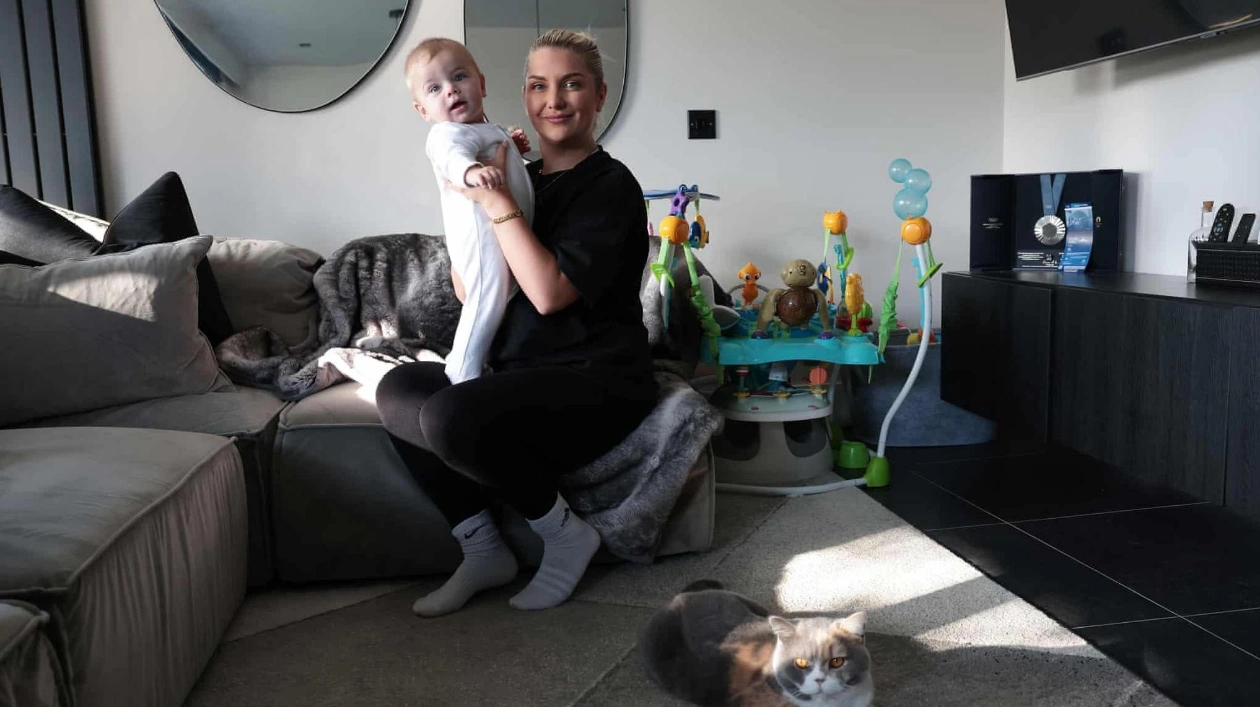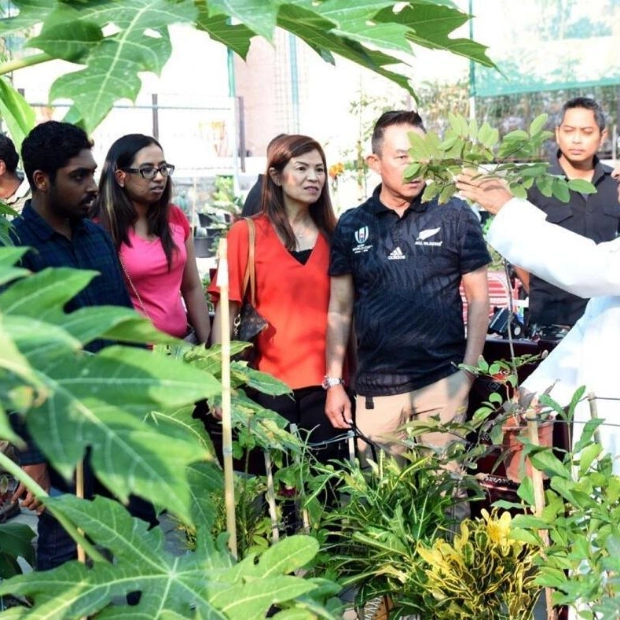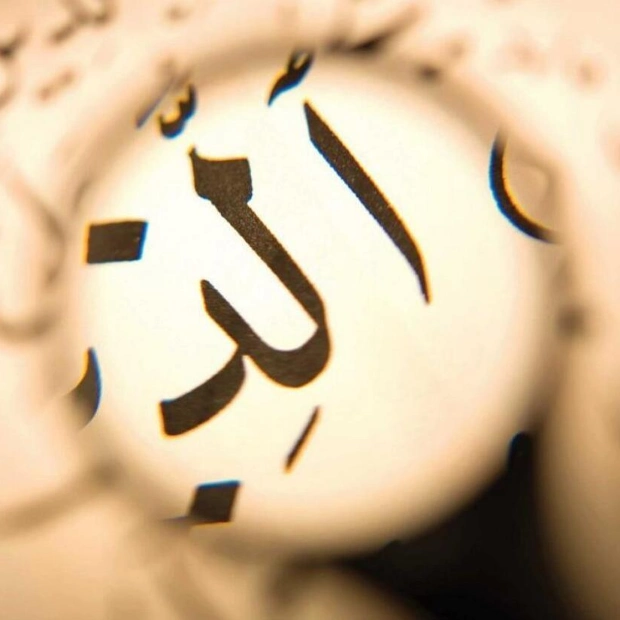Just as his mum, Amber Rutter, is recounting how the sight of him made everything bearable amidst Olympic heartache, Tommy chimes in on the baby monitor; the cries of an early wake-up from his morning nap. “Sorry, I’ll have to put a pacifier in and see if he goes back to sleep,” says Amber, stepping over Mila the cat – lounging on the living room rug – and hurrying upstairs to tend to her six-month-old son. She returns shortly: “Sometimes he can settle himself, or sometimes he decides he’s just awake. We’ll see which this one is.” The silence is brief before contented gurgles replace the quiet, Amber casting occasional glances at the screen to ensure Tommy is okay. Like all new parents, sleep is paramount in her thoughts. The memory of the dreaded four-month sleep regression lingers, though she acknowledges her good fortune: Tommy slept through the entire return flight from their recent family holiday to Barbados and has started sleeping through the night.
Amber’s Olympic silver medal is displayed in its case next to the sofa in her immaculate Berkshire home, surrounded by baby essentials; a testament to her ability to balance her life as an elite shooter and a mother, a feat few thought possible. When she announced her intention to compete at the Paris Olympics just three months after giving birth, Amber, 27, had no expectations: “I honestly didn’t think I would do very well.” Her return with a skeet silver medal was almost unimaginable. Yet her remarkable achievement was marred by controversy, a shadow she feared would be inescapable until the sight of Tommy in the French countryside brought clarity.
To fully understand, one must go back three years to the Covid-delayed Tokyo Olympics, where Amber was ranked world No 1 but had to withdraw due to a positive test the night before her flight to Japan. It was a crushing blow that nearly made her quit the sport. When a similar incident arose at the Paris Games, her first thought was how she could cope again. During the sudden-death shoot-off for gold, Amber was ruled to have missed a shot when footage clearly showed it had hit. Attempting to appeal, she was informed that video replays were not in place at the Olympics, despite their regular use in other international competitions. She had to settle for silver behind Chile’s Francisca Crovetto Chadid, while millions in Britain watched in anger on BBC.
By the time she spoke to the few media present at the Chateauroux Shooting Centre, 270km south of Paris, a calm Amber was determined not to let the dispute overshadow her achievement. That, it turns out, was thanks to Tommy. “I was really upset, but there’s only so much you can do in that moment,” she recalls. “I tried to argue, but when they told me to get off the stand, I knew kicking and screaming would only be remembered negatively. When I came off, I went straight to my mentor, Richard [Brickell], and started crying uncontrollably. The thought that went through my mind was how I could live through the ‘what-ifs’ again after Tokyo. It was only when Richard turned me around and I saw James [Rutter’s husband] with Tommy that everything lifted. I hated the Olympics for so long, but I didn’t want to go down that route again. It’s not about the medal, it’s about redemption. Winning a medal with my son watching was the closure I needed. That’s how I can live with what happened. My family is the most important thing.”
The acceptance is genuine, and she knows nothing can be done after the event, but the injustice still bothers her. Ten days after the final, she addressed the matter on social media, asking for an apology and assurances that such an error would not be repeated. She has heard nothing from the International Shooting Sport Federation or the International Olympic Committee. “I think I owed it to all the girls in that final who were cheated out of a fair result,” she says. “Somebody needs to admit they got it wrong and promise to improve in the future. That’s what I was looking for: accountability. Maybe the letter got lost, but nobody even acknowledged it. The organizers really messed up. They let not only the competitors down but the viewers. It makes shooting look amateur.”
Amber’s only shooting since has been casual mornings firing at clays with her family. Instead, her focus has been on her growing family, which includes Mila the cat, Wolf the rottweiler, and a large tank of tropical fish that she explains is looking murkier than usual due to a recently added piece of driftwood. Her diary is increasingly filled with public speaking engagements for corporations wanting to learn from her journey, and she launched her own shooting apparel range in September. The original plan was to “take a step back” from elite sport and not target the Los Angeles 2028 Olympics. “But it doesn’t always work like that,” she explains, recounting being recognized while swimming in the Caribbean sea, which makes her likely to continue for the next four-year Olympic cycle. “From the success you have off the back of a successful Olympics, it’s too big an opportunity to say I wouldn’t do the next one,” she says. “I haven’t made a clear decision, but if that reason is important enough, that’s why you do it. When I first started, it was because I loved spending time with my grandad. Then there were times when I loved winning and representing my country. Now I’m doing it because it’s my job. I have a family to support, and I’ve learned to accept it.”
Making the Olympic podium so soon after giving birth remains a source of great pride. She acknowledges that “shooting isn’t like sprinting or jumping,” allowing her to return to competitive action when most first-time parents would only just be emerging from their newborn cocoon. “But I really hope to set an example,” she adds. “I hope it shows that you shouldn’t put off important things in your life like becoming a mum, getting married, or any other big life goals. You can make everything work. It might be challenging and very tiring, but it is possible.” So, presumably, Amber’s experience means she would not think twice if she found herself pregnant again so soon before sport’s biggest competition? “I definitely wouldn’t be doing it three months before the Olympics again, I can tell you that,” she says, laughing. “If you wanted to, you can do it. But there’s easier ways. Personally, the next baby is going to be more planned. The fact I managed to make everything work when I wanted it to is something I’m so proud of: to be able to win an Olympic medal, become a mum, and get married all without sacrifice.” A sudden increase in Tommy’s volume on the baby monitor prompts Amber to stand up. “Right, I’ve got to go and get him because he’s going to kick off,” she says, heading back upstairs, passing a photograph of her with Tommy in her arms after winning the Olympic medal. It is an image that was never meant to exist, Amber having given her husband strict orders not to travel to France with their baby for fear of distracting her. Only when she turned around, paralyzed by emotion at her lowest ebb, did she realize how grateful she was that he had disobeyed her. “It’s the one and only time I’m so glad my husband didn’t listen to me,” she says. “That moment will stick in my mind forever.”
Source link: https://www.theguardian.com






